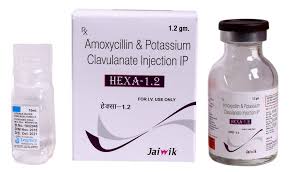Here is the detailed overview for:
💉 Amoxicillin (A) + Clavulanic Acid (B) Powder for Injection
Strength: 1 g Amoxicillin + 200 mg Clavulanic Acid
Form: Sterile powder for reconstitution (IV/IM use)
🧪 Nature / Drug Class
- Amoxicillin: Broad-spectrum β-lactam antibiotic (penicillin group)
- Clavulanic acid: β-lactamase inhibitor (prevents bacterial resistance)
- Combination enhances activity against β-lactamase–producing bacteria
🩺 Purpose / Indications
Used to treat moderate to severe infections caused by resistant organisms, including:
- Community-acquired and hospital-acquired pneumonia
- Skin and soft tissue infections
- Intra-abdominal infections
- Bone and joint infections
- Urinary tract infections
- Sepsis, gynecologic infections, surgical site infections
⚙️ Advantages
✔️ Broad-spectrum including resistant gram-positive and gram-negative bacteria
✔️ Suitable for empirical therapy in hospitals
✔️ Effective where oral antibiotics fail or are not tolerated
✔️ Safe for use in ICU/critical care settings
💊 Dosage & Administration
- Adult dose: 1.2 g (standard), every 8 hours, may increase to every 6 hours in severe infections
- Route:
- IV slow injection over 3–4 minutes
- IV infusion over 15–30 minutes
- Deep IM injection (less common at this dose)
- Reconstitution:
- For IV injection: Reconstitute with 20 mL of water for injection
- For infusion: Further dilute in 100 mL NS/D5W
- Pediatric use: Based on body weight – consult pediatric dosing guide
- Renal adjustment: Dose interval adjustment required in renal impairment
📦 Common Packaging
- Glass vial containing 1.2 g powder (1 g amoxicillin + 200 mg clavulanic acid)
- Sometimes supplied with sterile water ampoule for dilution
⚠️ Patient Advice / Precautions
- Check for penicillin allergy before administration
- Monitor for diarrhea, rash, liver function abnormalities
- Use with caution in hepatic or renal impairment
- Avoid mixing with blood products or proteinaceous fluids
💢 Common Side Effects
- Injection site pain or thrombophlebitis
- Nausea, vomiting, diarrhea
- Rash, hypersensitivity reactions
- Rare:
- Anaphylaxis
- Liver enzyme elevation
- Clostridioides difficile–associated diarrhea
🧊 Storage
- Store below 25°C in a dry, dark place
- After reconstitution, use immediately
- Do not freeze reconstituted solution
- Discard any unused portion

